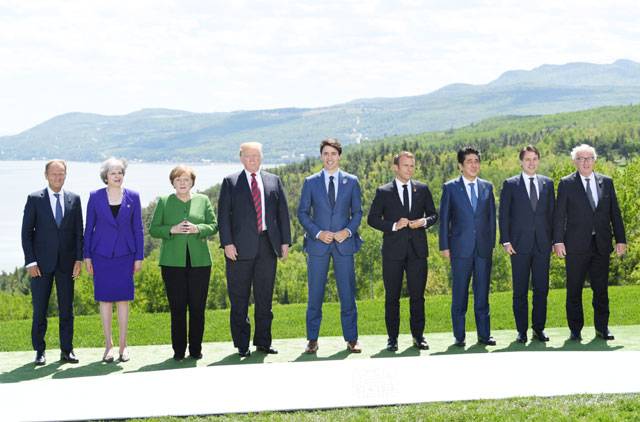LA MALBAIE, Canada - President Donald Trump drove the wedge splitting Washington from its Western allies even deeper on Friday with a shock call for Russia to be readmitted to the G7 club of nations.
As the leaders of the top industrialized democracies began meeting ahead of the G7 summit in Quebec, European leaders warned that Trump's stance threatens the Western-led world order. Already angered by Trump's positions on trade, climate change and the Iran nuclear deal, the other G7 allies now face a rift in the united western front against Russian aggression.
Before jumping on Air Force One to fly to Canada, which is hosting the summit in La Malbaie north of Quebec City, Trump called for a return to the body's pre-2014 "G8" formula. "They threw Russia out. They should let Russia come back in because we should have Russia at the negotiating table," the US leader said before boarding the presidential jet.
Moscow was expelled from the rich nations club, which sees itself as a guarantor of rules-based order and the global economy, over its annexation of Ukraine's Crimea region. While Italy's new premier Giuseppe Conte, the head of a populist coalition, sided with Trump, many other European leaders were horrified and warned against the idea.
"It is evident that the American president and the rest of the group continue to disagree on trade, climate change and the Iran nuclear deal," EU president Donald Tusk admitted.
Tusk warned that "the rules-based international order is being challenged, quite surprisingly not by the usual suspects but by its main architect and guarantor, the US." And he said Trump's determination to bait his allies over trade and diplomatic engagements "would only play into the hands of those who seek a new post-West order where liberal democracy and fundamental freedoms would cease to exist."
Trump was the last G7 leader to arrive and on Saturday, he will probably be the first to leave, in a hurry to move on to his nuclear summit with North Korea's Kim Jong Un in Singapore.
Trade battle lines were drawn even before he arrived in a series of dueling tweets and statements between Trump and his onetime friend French President Emmanuel Macron.
With unmistakable symbolism, the fractious Western democracies were meeting on the same day that China's President Xi Jinping welcomed his Russian counterpart Vladimir Putin to Beijing.
Three decades after the end of the Cold War, the G7 nations are split over trade, climate and multilateral engagements such as the Iran nuclear deal.
And at the same time, the US president seems more at home with autocrats than with Washington's traditional allies.
The "America First" president's broadside before leaving Washington reinforced predictions that the Quebec G7 would be the first such summit to end without an agreed joint statement. "All of these countries have been taking advantage of the United States on trade," he said before flying out. "We have massive trade deficits with almost every country. We will straighten that out. And I'll tell you what, it's what I do. "It won't even be hard and in the end, we'll all get along."
Host Canada and its European allies are striving to put together a united front to oppose Trump's tariffs of aluminum, steel, cars and other exports, but the markets are rattled. European and Asian stocks indices were down across the board Friday - despite a week of gains in the wake of robust US jobs data and easing political headwinds in Italy and Spain. In New York, the Dow dipped in early trade. Macron and Canada's Prime Minister Justin Trudeau, who also sought friendship with Trump, made it clear they would prefer no consensus to a climbdown on trade. "The American president may not mind being isolated, but neither do we mind signing a six country agreement if need be," Macron said in a tweet. Trudeau told reporters the US national security justification for the tariffs on steel and aluminum was "laughable."
Macron was to meet with Britain's Theresa May, German Chancellor Angela Merkel and Conte ahead of their talks with Trump.
On Friday, the bilateral meetings precede roundtable discussions before they tuck into a dinner of lobster, asparagus and maple leaves nestled on a brioche at the end of the first day of talks.
The summit is being held at a luxury resort more than two hours' drive from the provincial capital, where more than 400 protesters faced off late Thursday against police.
Previous G7 summits have seen large-scale anti-globalization protests, but Trump was a main target of the demonstration as masked anarchists set fire to US flags and those of other G7 nations.






